CERTHE CONTEMPORARY DANCE
Type: Higher Education
Qualification: Certificate of Higher Education (CertHE) Contemporary Dance
Duration: 1 year (full-time) September - July
Validated by: University of Kent
The Certificate of Higher Education (CertHE) in Contemporary Dance is a course specifically designed for preparing dance artists to undertake further in-depth professional training. This programme provides an insight into the three-year full-time degree and has an excellent record for helping students to access conservatoires and Higher Education.
Students are enriched by a range of technical, creative and performance experiences in a variety of contexts, all of which support them at the start of their journey towards a career in dance. 98% of students who completed this programme in 2023 progressed to further dance training either at NSCD, another conservatoire or another university.
This programme is also suitable for 16/17-year-olds as a full-time alternative access route to Higher Education.
APPLICATIONS FOR 2024 ENTRY ARE CLOSED
Download Course Fact File
Course overview
Through the programme students embrace a range of industry relevant modes of working, such as Dance Practices (including Contemporary, Ballet and other dance forms such as Afro-fusion), Improvisation, Choreography, Contextual studies, Performance and Dance repertoire, in order to give them a thorough grounding in traditional theatre practice.
Please note: this course is suited to individuals who need more time to develop their technical and creative and critical thinking skills in order to meet the criteria for entry onto our degree programme. It is also a recommended route of study for applicants who are looking for a one-year intensive programme of study, or are undecided whether they are ready to commit to three years full time training. This programme is also suitable for 16-17 year olds as a full time alternative access route to Higher Education.
The course operates on a modular basis. All modules count for either 15 or 30 academic credits. Each credit taken equates to a total study time of around 10-20 hours. Total study time includes scheduled teaching, independent study, directed study and assessment activity. All students take a total of 120 credits for the CertHE as a whole.
NSCD programmes of study are validated by the University of Kent. The Programme Specification is available here: CERTHE Contemporary Dance – Programme Specification
Life at NSCD
Living in Leeds
Entry requirements
For CertHE-level courses we welcome applicants aged 16+ (including mature applicants).
Entry to this course is through successful audition and interview.
Additionally, candidates will usually have gained:
- five GCSE passes (grade C/4 or above), which must include English Language
- two A Level passes / a L3 BTEC National diploma or professional/vocational training at an appropriate level
(Equivalent qualifications may also be accepted depending on the strength of the grades achieved. Equivalent overseas qualifications are also accepted.)
Applicants who don’t meet the usual entry requirements will need to complete a Matriculation Task as part of their entry.
If you have any questions about entry requirements or require further information, contact admissions@nscd.ac.uk
Teaching and learning
You are taught through a combination of practical classes and workshops, lectures and seminars. Seminars and small group tutorials enable you to discuss and develop your understanding of topics covered in lectures in smaller groups. In addition, you have timetabled meetings with your academic tutors. You use industry-standard facilities throughout your course.
At level 4 (as a guide) you typically have around 21 contact hours per week, typically consisting of:
- 18 hours of practical classes or workshops
- 1 hours of seminars /tutorials
- 2 hours of lectures
- 2 hours directed study
Assessment and Feedback
NSCD employs a wide variety of assessment methods including formative, continuous and summative assessment.
Assessment evidence is collected through:
- Continuous and summative assessments in dance practices, creative and performance modules
- Assessed rehearsal processes
- Showings of performance, choreographic work, improvisation & movement research
- Essay &/or written reflection
Students receive ongoing feedback in practical classes and through the tutorial system in which professional and academic development are considered and evaluated.
Overall workload
Your overall workload consists of class contact hours, around 21 hours per week, on top of this independent learning which is expected to be at least 1.5 hours per module, rehearsals (varies) and assessment activity with each credit taken equating to a total study time of around 28 hours. While your actual contact hours may depend on the modules being delivered each term e.g. intensive rehearsal periods.
NSCD VALUE ADDED
We are devoted to the experience we give our students. Based on a comparison with other HE Dance degrees of the same price, we offer the following as ‘value added’:
- A full term extra of tuition (May-July) including classes, support and guidance
- On average more contact hours per week (creative workshops and technique classes)
Plus
- Enrichment classes are often offered in the evening where staff, guests and students put on additional class activities.
- Visiting workshops with guest choreographers and companies
- Access to visiting artists and practitioners talks
- Cost of travel to ‘site’ work
- Career development workshops inc. audition preparation
- Sponsored Theatre Visits
- On-site injury intervention and physio support
- Reduce priced theatre tickets and deals
- On-site counselling service
- Access to additional rehearsal spaces
- Access to projects and research run by staff and our network of partner organisations
- Subsidised support for external injury support including Physiotherapy, Osteopathy and Acupuncture
- Connection to projects which cross the small specialist institutions in Leeds







